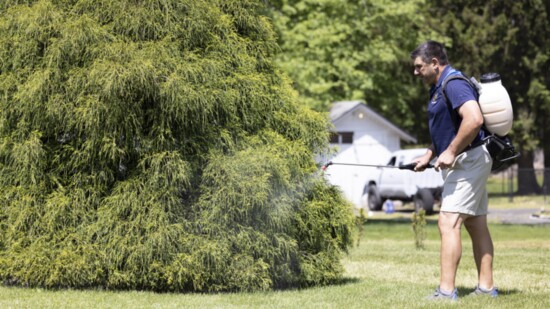Do you have ragged rhododendrons and holey hosta? You may have some hungry visitors munching on your prized shrubs and plants. These creatures also find your tulips tasty and daylilies delicious. They are your white-tailed "deerest" friends.
New Jersey Deer Control offers a safe and effective deer-repellent strategy. We spoke to founder and wildlife biologist Christopher J. Markham, who developed a patented, natural product to prevent deer damage after years of research and field testing. Read on to learn how to prevent deer damage in your yard.
What has caused the significant increase in the deer population over the past decades?
A combination of factors. Deer are a prey species, and every prey species needs predators to keep its population in check. In the case of the white-tailed deer, its main natural predators were historically wolves and mountain lions. However, they have largely been eliminated.
Hunting has helped keep some deer populations in check in certain areas, but it decreases in many suburban areas. In addition, hunting as a sport has dramatically declined over the years.
The second factor leading to the population explosion is suburban sprawl. Deer are what we consider an "edge species." This means they prefer an environment comprising fields and forest adjacent to each other instead of large, homogenous tracts of either. Suburban sprawl--especially when high-end landscaping is involved—has created this perfect environment. The result is an increase in food sources with small pockets of forest or dense landscaping to provide cover and protection. When you factor in the lack of predators, we have not only created an environment for deer to not only survive--but to thrive!
What plants and shrubs are some of their "favorites"?
Tulips, daylily, and hosta are three of their favorites in the spring and summer. In the winter, they love to eat yew, euonymus, and arborvitae. That being said, high population numbers can force changes—and tastes—over time, and many species of shrubs and flowers that were once considered "deer resistant" are now commonly foraged.
Interactions between deer and human populations are unavoidable these days. What are some things to know?
Fencing, repellents, and planting choices are the best deterrents. Keep in mind that a deer can jump an 8-foot fence, but many communities restrict fencing heights. The smell and effectiveness of repellents, combined with their rain resistance (or lack thereof), have often frustrated many homeowners. However, professional companies like New Jersey Deer Control can help make a difference. And lastly, the choice of plants can also help dramatically, as some species of shrubs and flowers are much less palatable to the deer. Remember that "deer-resistant" does not equal "deer-proof"!
What are the advantages of your proprietary repellent?
I invented it myself over 25 years ago, and it has many unique aspects. To start, deer do not like the smell or the taste of the repellent, and unlike many store-bought repellents, it does not discolor your plants or have an offensive odor. In addition to this, once it is dry, it is very rain resistant.
We mix it fresh each morning so it cannot be sold in stores. Our ability to use these particular ingredients and prepare them every day is a significant factor in its effectiveness compared to other products and companies.
Most store-bought repellents often have a foul smell. Our proprietary repellent is rarely detected by the homeowner (by sight or smell), but that does not mean it's ineffective. A deer's nose is 80 times more sensitive than a human's, so even though most people will never smell it, a deer can!
How often should a property owner treat their yard? Is this a seasonal treatment, or must it be done all year long?
Each property's needs are unique. Although about 75% of our customers need year-round protection, about 20% focus on their spring/summer plantings, while the other 5% focus on protecting their evergreen material during the winter months. From mid-August to mid-April, we schedule an application every four weeks, while we move to a more aggressive three-week schedule during the height of the growing months. This averages about 14 applications per year for year-round customers, but seasonal applications are also an option.
New Jersey Deer Control has 15 trucks on the road, six days a week, serving Bergen and surrounding counties. Staying on a strict schedule is part of our company's success and our commitment to customer service," says Chris. "We are not just a deer repellent company, but a management strategy. This is why we can help homeowners "take back their yard"!
njdeercontrol.com




